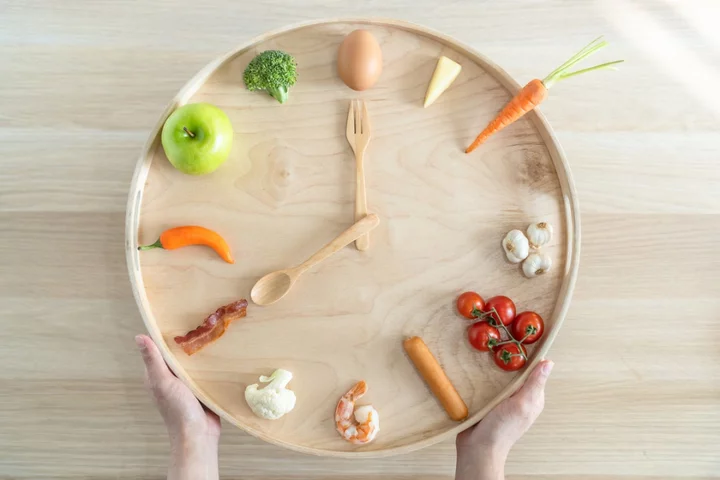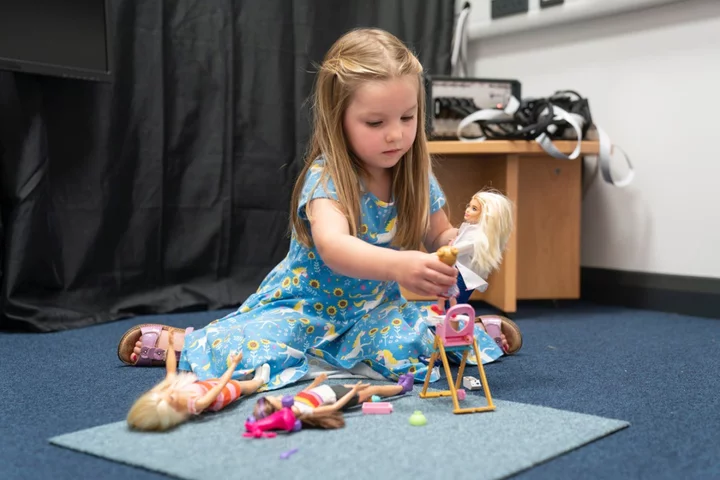
Climbing more than five flights of stairs a day can decrease the chances of heart disease, study suggests
Cardio isn’t so bad if you take it in small steps. Climbing at least 50 stairs each day could significantly slash your risk of heart disease, according to a new study. The research, published in the journal Atherosclerosis, found that ascending more than five flights of stairs daily could reduce the risk of cardiovascular ailments by about 20 per cent. Cardiovascular diseases such as Atherosclerotic cardiovascular disease (ASCVD) along with coronary artery disease and strokes are the leading causes of morbidity and mortality worldwide. “Short bursts of high-intensity stair climbing are a time-efficient way to improve cardiorespiratory fitness and lipid profile, especially among those unable to achieve the current physical activity recommendations,” said co-author Dr Lu Qi, HCA Regents Chair and professor at Tulane University’s School of Public Health and Tropical Medicine in New Orleans. “These findings highlight the potential advantages of stair climbing as a primary preventive measure for ASCVD in the general population.” For the study, researchers used data from a UK Biobank of 450,000 adults and participants were analysed based on their family history of cardiovascular disease as well as their genetic risk factors and established risk factors. Participants were also asked about their lifestyle habits and their frequency of climbing stairs, with the median follow-up time being 12.5 years. The results revealed that climbing more stairs daily reduced the risk of cardiovascular disease in those who were less susceptible, with Dr Qi saying the increased risk of heart disease in more susceptible people could be “effectively offset”. “This study provides novel evidence for the protective effects of stair climbing on the risk of ASCVD, particularly for individuals with multiple ASCVD risk factors,” Dr Qi added. ‘A significant training effect’ Dr Nicolas Berger, a senior lecturer in sport and exercise at England’s Teesside University, who was not a part of the study, says walking up staircases has more benefits than walking on a flat surface because it “requires the use of more muscles as well as some balance and gross motor skills.” He says even though these may be in “short bursts”, it still “requires a lot of activity from your cardiovascular system and that is why people often find themselves out of breath whilst climbing stairs. “These short, intermittent bursts of activity have large benefits in terms of reducing the risk of cardiovascular disease. They can significantly increase your heart rate and oxygen uptake and cause positive adaptations in the body,” Dr Berger adds. Although 50 steps a day might not seem like much “it can have a significant training effect.” This type of movement activates muscles such as the glutes, quads, hamstring and calves, as well as muscles in the core, Dr Berger says. If you are not much of a runner, Dr Berger suggests taking stairs may be a useful option. “It’s an attractive alternative to just walking or running for many, due to the easy access for most people in their houses or when out. “If there are no stairs available, walking up and down steep gradients also has similar benefits and demands. Getting up off the floor or low ground has benefits in terms of strength and balance, but not so much for the cardiovascular system. “Overall, incorporating this activity into daily habits for sedentary people, people at risk or anyone trying to stay healthy is a good suggestion,” he adds. Read More How many steps a day can cut risk of early death (and it’s not 10,000) Tread carefully: Do we really need to walk 10,000 steps a day? What I gained (and lost) by walking 10,000 steps each day for 5 months Is a four-day week a good idea? | You Ask The Questions 9 science-backed ways to lose weight without going on a diet A Japanese doctor who studied longevity — and lived to 105 — said if you must retire, do it well after 65
2023-09-30 00:23

Knaresborough man raises money to send fire engine to Ukraine
Bob Frendt from Knaresborough buys an emergency vehicle for a city left without fire engines.
2023-09-29 21:49

The exact time Brits find themselves ‘uncontrollably hungry’ revealed
One in four Brits find themselves uncontrollably hungry by 10:30 am, research has found. A study of 2,000 adults found they typically snack twice a day, with sausage rolls, crisps, biscuits and bananas the most popular choices. But 27 per cent get the munchies by mid-morning, and a third have even got out of bed for a midnight snack. Other popular treats include chocolate bars, nuts, cake and crackers. A spokesman from Wall’s, which commissioned the research as part of its ‘When hunger calls, grab a Wall’s’ campaign, said: “Sometimes a snack can be an absolute saviour to your day as the research has shown. “Uncontrollable hunger at times can absolutely take over and leave you unable to get on with your day until it’s been satisfied. “And there’s real enjoyment taken from ridding of this hunger whenever it strikes with a snack never being far away.” The study also found 23 per cent of adults don’t usually have breakfast, with 36 per cent of those claiming they are more prone to snacking as a result. When watching TV, over the weekend and in the workplace were the most common times and places to chomp on a treat. And more than £10 is spent on them in a typical week, according to the OnePoll data. More than seven in 10 (73 per cent) have snacks stocked up in their homes for when they need them, and 25 per cent have hidden them from loved ones. While 21 per cent have a dedicated drawer in their workplace for keeping them for when hunger calls. The importance of a snack cannot be underestimated though as 60 per cent believed a great treat can save a rubbish day. To avoid a bad day, 33 per cent will typically pack one for themselves when leaving the house. However, 20 per cent have been made to feel guilty about their snacking habits with others pointing out the frequency they so do. A spokesperson from Wall’s [https://www.instagram.com/wallspastry], added: “Hunger can be overpowering and there’s nothing worse than being caught short and having nothing to hand. “However, there’s no better feeling than finally chomping on something after having been hungry for a while and satisfying that desire. “Snacks such as sausage rolls are a great and versatile option for when hunger calls.” Top 20 most popular snacks, according to Brits: 1. Crisps 2. Biscuits 3. Chocolate bar 4. Banana 5. Nuts 6. Cookies 7. Cake 8. Toast 9. Apple 10. Grapes 11. Crackers 12. Cereal bar 13. Yoghurt 14. Sausage roll 15. Orange/satsuma 16. Cereal 17. Doughnut 18. Berries 19. Flapjack 20. Popcorn Read More Smoking during pregnancy doubles premature birth risk, study finds Four in ten Brits ignore potentially serious eye problems, study finds Study finds women only give themselves 30 minutes of self-care a week Children avoid sleepovers due to fears of wetting the bed Most unwanted gifts people have received The best napping method to help with pulling an all-nighter
2023-09-29 18:55

Nicole Thea's husband Global Boga says he's saving lives in her name
Global Boga says he’s "back and stronger" after launching a foundation in his late wife's name.
2023-09-29 18:53

Daily activities could help lower heart attack risk, study suggests
Everyday activities like walking up the stairs or playing with children could help lower the risk of heart attack, stroke and even premature death, new research suggests. The experts found that although short bouts of incidental activity are good for you, the how long you do them for, and how vigorously makes a difference. The findings may make physical activity much more accessible to people who are unwilling or unable to take part in structured exercise, researchers say. They found that the longer the bouts of activity, the better, regardless of total activity levels. The large majority (97%) of this everyday physical activity, like walking to the bus stop or household chores, was made up in bouts lasting less than 10 minutes. In a group of people who said they did not take part in exercise or sport, short bouts of less than 10 minutes at a moderate to vigorous intensity were associated with a steep decrease in heart attack and stroke, and death by any cause. According to the findings, moving consistently for at least one to three minutes was linked to significantly more benefit (29% lower) than very short bouts of movement that lasted less than one minute. Senior author Professor Emmanuel Stamatakis from the University of Sydney’s Charles Perkins Centre, in Australia, said: “From walking up the stairs to speedily mopping the floors, in recent years we’ve come to understand that it is not just structured exercise that is good for our health, but we know very little about how these short bouts of incidental activity translate to health benefits.” He added: “The take-home message here is any type of activity is good for your health, but the more effort you put into those daily tasks and the longer you keep up that energy, the more benefits you are likely to reap. “If you are huffing and puffing and unable to hold a conversation for some of that time you have hit the sweet spot.” Lead author Dr Matthew Ahmadi said: “The idea of accruing short bouts of moderate to vigorous activity through daily living activities makes physical activity much more accessible to people who are unwilling or unable to take part in structured exercise. But as we see in this data, the length and the vigour people put into these incidental activities matters.” The risk of all-cause death and major cardiovascular events (heart attack or stroke) was 29-44% lower for activity periods of five minutes to less than 10 minutes, than bouts of less than one minute. The study, published in The Lancet Public Health, also found that the higher the amount of vigorous activity in each bout the better. People who huffed and puffed for at least 15% of the activity period (10 seconds per minute) saw the greatest benefit. Bouts of less than one minute were also associated with benefits if the above 15% vigorous activity rule was applied, researchers found. The researchers used data from wrist devices worn by 25,241 people aged 42 to 78, in the UK Biobank database, and artificial intelligence to analyse the seven-day physical activity patterns in people who said they did not exercise. The study linked these physical activity patterns with health records, following people for close to eight years to identify how length and intensity of physical activity bouts were linked to health status. Dr Ahmadi added: “This study suggests people could potentially reduce their risk of major cardiac events by engaging in daily living activities of at least moderate intensity where they are ideally moving continuously for at least one to three minutes at a time. “In fact, it appears that this can have comparable health benefits to longer bouts lasting five to 10 minutes.” Read More Charity boss speaks out over ‘traumatic’ encounter with royal aide Ukraine war’s heaviest fight rages in east - follow live From tiredness to sweating – subtle warning signs something could be wrong with your heart Breast Cancer Awareness Month: 9 brilliant beauty buys supporting good causes Smokers 2.6 times more likely to give birth prematurely
2023-09-29 16:48

From tiredness to sweating – subtle warning signs something could be wrong with your heart
People can go years with no idea they have something wrong with their heart. Symptoms can be vague and subtle and many heart conditions are ‘hidden’ – meaning they’re not obvious from the outside. “Hidden heart conditions often go undiagnosed for too long, until something goes wrong or it’s too late,” says Sindy Jodar, senior cardiac nurse at the British Heart Foundation (BHF). “That’s why it is important to never ignore the signs of heart disease and get yourself checked, just to be sure.” While some warning signs are easy to spot – such as severe chest pain and collapse – there are also many little indicators that something could be wrong with your heart or circulatory system. These won’t necessarily mean you have a heart problem, but it’s always best to have them investigated. From tiredness and nausea to fainting, here are some of the less obvious symptoms everyone needs to know about… 1. Feeling unusually tired Dr M Adil U Khan, a GP at Pall Mall Medical, says you should not “ignore or downplay unusual levels of tiredness”. While it’s normal to feel exhausted if you’ve been very busy or lacking sleep, he adds: “Feeling unusually tired, especially if it’s not related to exertion, should be investigated.” It could be due to something like anaemia, a virus, or even linked to mental health. It could also be related to your heart, so it is important to have it investigated. 2. Subtle discomfort “Look out for subtle discomfort in different areas of your body, including discomfort or pain in the jaw, neck, back, or stomach, which can be associated with a heart problem,” says Khan. If symptoms are out of the norm for you and aren’t going away, it’s always best to get them checked. 3. Unusual swelling Perhaps you have noticed your ankles look particularly puffy, or maybe it’s your general tummy area that’s constantly swollen for no apparent reason. “Unexplained swelling, known as oedema, in the legs, ankles or abdomen, may also be signs of heart failure,” explains Khan. 4. Vomiting and a choking sensation Sudden vomiting or a choking sensation in your throat is something to be wary of too. “While not every bout of nausea means there could be something serious happening, feeling sick combined with other aches and pains, such as severe chest pain, should ring an alarm bell,” says Jodar. Yes, it could be a stomach bug, but if you are having sudden spells of vomiting and nausea more regularly and you’re not sure why, don’t delay in get things checked out. 5. Fainting If you experience sudden fainting, this is a big indicator of something being awry. “If fainting or any other symptom becomes a problem, consult a healthcare provider and schedule an appointment with a doctor or cardiologist,” says Khan. “Discuss your symptoms, medical history and risk factors with them. “Your healthcare provider will assess your vital signs and perform a physical examination. Depending on your symptoms and risk factors, you may undergo diagnostic tests like ECGs, echocardiograms, stress tests, blood tests, or more specialised cardiac assessments,” he adds. 6. Shortness of breath Struggling to catch your breath is not a trivial matter. “Anyone experiencing shortness of breath during everyday activities or at rest should see their doctor,” says Khan. This is especially the case if it’s accompanied by chest pain – even if it doesn’t seem especially severe. Khan adds: “Mild chest discomfort should always be investigated, but some people mistake this for indigestion or muscular pain.” 7. Unusual sweating “Feeling hot, clammy and quite sweaty when you haven’t been doing strenuous exercise shouldn’t be ignored,” adds Jodar. “If this is combined with chest pains, it’s important you get yourself looked at.” 8. Heart rate irregularities Does your pulse sometimes feel jumpy or too fast? Get it checked with your doctor. Khan says: “Smartwatches and fitness trackers can provide valuable data about your heart rate and may detect irregularities to some extent. They can help track general trends in heart rate, especially during physical activity or rest. “However, they are not a substitute for medical-grade monitoring and evaluation… Any concerning symptoms should be evaluated by a healthcare professional for a comprehensive assessment and diagnosis,” Khan adds. Read More Charity boss speaks out over ‘traumatic’ encounter with royal aide Ukraine war’s heaviest fight rages in east - follow live Breast Cancer Awareness Month: 9 brilliant beauty buys supporting good causes Smokers 2.6 times more likely to give birth prematurely Female students ‘more than twice as likely’ to be affected by poor mental health, research shows
2023-09-29 15:58

Intense rain across New York City and parts of the Northeast Friday could flood subways and roads
A coastal storm is expected to drop a prolific amount of rain over millions in New York City and the Northeast Friday, with rainfall intense enough to flood subways and roads.
2023-09-29 12:47

High-impact flood event targets New York City
A high-impact flood event is taking shape for the New York City area as a coastal storm moves in overnight and threatens to dump prolific amounts of rain Friday.
2023-09-29 09:59

Takeaways from President Biden's first impeachment hearing by House Oversight panel
House Republicans kicked off their first impeachment inquiry hearing Thursday laying out the allegations they will pursue against President Joe Biden, though their expert witnesses acknowledged Republicans don't yet have the evidence to prove the accusation they're leveling.
2023-09-29 01:49

Fact check: House Republicans first hearing in Biden impeachment inquiry
The GOP-led House Oversight Committee is holding its first hearing Thursday in the impeachment inquiry of President Joe Biden. Republicans have made Hunter Biden's business dealings the central focus of their impeachment inquiry, but there is no public evidence to date that the president personally received any money.
2023-09-29 00:54

Playing with dolls could help a child’s social development
Playing with dolls could help the social development of children - including those with neurodiverse conditions such as autism, according to a study. The research, from Cardiff University, found children exhibiting higher levels of autism traits showed increased brain activity in a key region associated with social processing when engaging in conversations with individuals during doll play. The new findings suggested that broader social engagement with others while engaging in doll play was a unique pathway to social development for these children. This was in contrast to what was observed in neurotypical children, who were more likely to discuss the dolls’ thoughts and emotions. However, researchers said that despite this difference, it showed that both groups may be able to benefit from doll play by using it as a tool for practising social scenarios and developing social skills, such as empathy. The findings are the latest release from a multi-year study by the Centre for Human Developmental Science at the university’s School of Psychology. Previous years have focused on neurotypical children and found wide-ranging social and developmental benefits of playing with dolls. Now, in its third year, the research team has replicated those results with a more diverse range of participants, including children aged between four and eight displaying both high and low levels of traits associated with autism. Lead researcher Dr Sarah Gerson said: “Our study shows that doll play can encourage social processing in children, regardless of their neurodevelopmental profile. “The findings show that all children, even those who display neurodivergent traits commonly associated with autism, may use doll play as a tool for practicing social scenarios and developing social skills, such as empathy.” State-of-the-art functional, near-infrared spectroscopy equipment was used to explore brain activation while children played with dolls and on tablets, both by themselves and with another person, replicating conditions from the first year of the study. While observing children, researchers saw increased brain activity in the posterior superior temporal sulcus (pSTS) region - which is heavily involved in social and emotional processing such as empathy - when playing with dolls, for both play with a social partner and during solo doll play, but less so during solo tablet play. The study’s results suggest that doll play could support social processing, regardless of a child’s neurodevelopmental profile, but through different pathways. For children displaying fewer autistic traits in the research, talking about the mental states and emotions of the dolls they were playing with was associated with increased pSTS activity. In contrast, for those displaying more autistic traits, talking with others during doll play, even when playing by themselves, led to more social processing on a neural level. Other research has shown that social processing and empathy skills are important determinants in children’s future emotional, academic, and social success. The study was a collaboration with the Wales Autism Research Centre. ‘Create a more inclusive and supportive environment for their development’ Its director Dr Catherine Jones said: “The study reinforces how it is important that that we acknowledge and value neurodiversity. “This means recognising and valuing the diverse ways in which children’s brains work and approaching social development in a way that is inclusive and accommodating for all children, regardless of their neurodivergence. “By embracing all ways that children choose to play, we can create a more inclusive and supportive environment for their development.” Since the landmark publication of Piaget’s theory of cognitive development, the effects of play have been thought to be positive for kids’ social skills and creativity, but this has never been scientifically evidenced at the brain level. The multi-year long-term study, commissioned by Barbie, is the first time key Piaget theories on play have been scientifically evidenced via brain imaging and the first to use neuroimaging evidence with natural doll play, meaning there was no prescribed storyline to show how the brain is activated during doll play. Michael Swaisland, head EMEA of insight and analytics, Mattel, said: “We are proud to know that when children, regardless of their neurodevelopmental profile, play with Barbie, their playtime may benefit their development. “As Barbie continues to inspire the limitless potential in every child, we are delighted to know, through neuroscience, that playing with dolls may encourage the development of social skills such as empathy in children, including those who display neurodivergent traits commonly associated with autism. “We look forward to uncovering even more benefits of doll play through our long-term partnership with Cardiff University as we look to shine a light on the benefits the play pattern has towards development, that parents might not have been aware of.” Parents and caregivers can visit here to learn more about the research and access resources. Read More Toys children play with can have an effect on their success in adulthood The best exclusive discount codes this payday Many parents of under 5s on less than £50k ‘quit work due to childcare costs’ – survey
2023-09-28 17:51

Some children avoid sleepovers due to fears of wetting the bed
Eight in 10 children who experience bedwetting have never attended a sleepover - because they’re too embarrassed. A survey of 742 adults, with children aged 4-11, found that 69 per cent of kids have turned down an invite to a sleepover party. And nearly as many (67 per cent) of parents have declined an invitation on behalf of their child. To help parents and kids deal with the experience, and help kids make friends and gain independence through sleepovers, Pampers Ninjamas teamed up with Dr Ranj Singh on educational and fun content discussing bedwetting, and how to prepare for nights out of the home. The three-part series provides education about why bladder leaks can happen, as well as practical tips on how to manage them, particularly during sleepover moments. Paediatrician, TV presenter and author Dr Ranj, said: “Sleepovers can play an important role in developing the confidence and independence of children, as well as for their enjoyment. “So I am proud to be helping the 82 per cent of children who are currently missing out, to offer practical advice as to how to better prepare for overnight stays with friends and family.” The research also found more than a quarter (26 per cent) of respondents are not comfortable discussing bedwetting with parents hosting sleepovers. And 35 per cent report an increase in bedwetting before going back to school, suggesting scholastic stress could be a trigger. To combat the situation, 76 per cent have invested in a waterproof mattress, while 68 per cent have purchased nappies for older children. Read More Playing with dolls could help a child’s social development Study finds free childcare reform has ‘little benefit’ to poorer families Most children in kinship care living with at least one grandparent, figures show
2023-09-28 17:50
